 Heritage Debate 2024 – Balancing the Books: How Should the Heritage Sector Be Funded?
Heritage Debate 2024 – Balancing the Books: How Should the Heritage Sector Be Funded?
Now in its 15th year, Heritage Debate brings sector leaders, professionals and volunteers together to share cross-sector insights, make connections and find solutions to the key challenges facing heritage today.
This year’s debate, 'Balancing the Books: How should the heritage sector be funded?', is a must-hear for all those invested in our sector’s future and its survival in today’s uncertain financial climate. Hear members of our expert panel make a case for the benefits and pitfalls of public, private and philanthropic funding models, and be part of this important discussion by casting your vote.
This year Heritage Debate will be free for all our delegates, but you will still need to book a ticket to attend. If you can, please consider making a small donation as part of your ticket to help the work of The Heritage Alliance.
The debate will be chaired by Carole Souter CBE, Chair of the Heritage Alliance and formerly Chief Executive of the National Lottery Heritage Fund, where she oversaw the distribution of billions of pounds of investment in culture, heritage and the environment. Together the panel and audience will share our views and decide the outcome of the debate in real time using interactive tools. There will also be the opportunity to submit questions for the panel. The panel will consist of:
• Caroline Underwood OBE, CEO of the Philanthropy Company - representing philanthropic and charitable giving.
• Claudia Kenyatta, Director of Regions at Historic England - representing public funding.
• Alex and Oli Khalil-Martin , custodians of the Crooked House, Lavenham - representing commercial income generation.
The event will also feature research research insights from Ecclesiastical Insurance, our corporate partner and event sponsor.
 Heritage Debate 2023 – Careers at a Crossroads: How Can We Future-Proof the Heritage Sector Workforce?
Heritage Debate 2023 – Careers at a Crossroads: How Can We Future-Proof the Heritage Sector Workforce?
We held our Heritage Debate for 2023 on Wednesday 15th November (11am-1pm, hosted online). The event drew a crowd of 182 participants and stimulated a lively discussion on the key challenges facing careers in heritage today.
Our panel of experts represented different streams of the sector workforce as they explored how careers in heritage can be made viable and rewarding into the future. They discussed challenges surrounding improved pay, diversity and inclusion, the promotion of heritage skills, supporting volunteers, and early career pathways – as well as reflecting on the strengths of the heritage sector and the passion and generosity of its people.
The debate was hosted by the Heritage Alliance’s Acting Chair Dr Ingrid Samuel OBE, and featured five panellists:
The event also featured new research insights from Ecclesiastical Insurance, which revealed some of the top current concerns for heritage organisations: the cost-of-living crisis, volunteer shortages, and staff recruitment and retention. At the end of the debate, audience ultimately voted for ‘pay and conditions’ as their top priority for heritage careers, with 36% of the vote. We hope that the debate sparked thoughtful conversations throughout the sector on tangible ways to strengthen and empower our workforce. Thank you to all attendees, and especially to our corporate partner Ecclesiastical Insurance and our event sponsor Heriot-Watt University for their support in making this debate possible.
In the lead-up to Heritage Debate 2023, our blog sought submissions of Letters of Advice for readers at a crossroad in their careers. You can browse all of the letters on our website, which tackle everything from starting your first apprenticeship to joining a board of trustees.

Heritage in 20 years: what will matter most?
We held our 2022 Heritage Debate on the evening of Thursday 24 November 2022, (5pm – 7pm online).
This year, five expert panellists made the case for one of 5 specific priorities, and why it will be the most important issue for the sector in 20 years’ time. Visit the Heritage Debate 2022 event page for our agenda and more about our 2022 speakers. This year, we also asked anyone with an interest in heritage to send us a short blog post on what they think will matter most to heritage in 20 years’ time.
Explore their broad range of perspectives by visiting our Heritage Debate 2022 event page and explore further resources that we shared during the event.
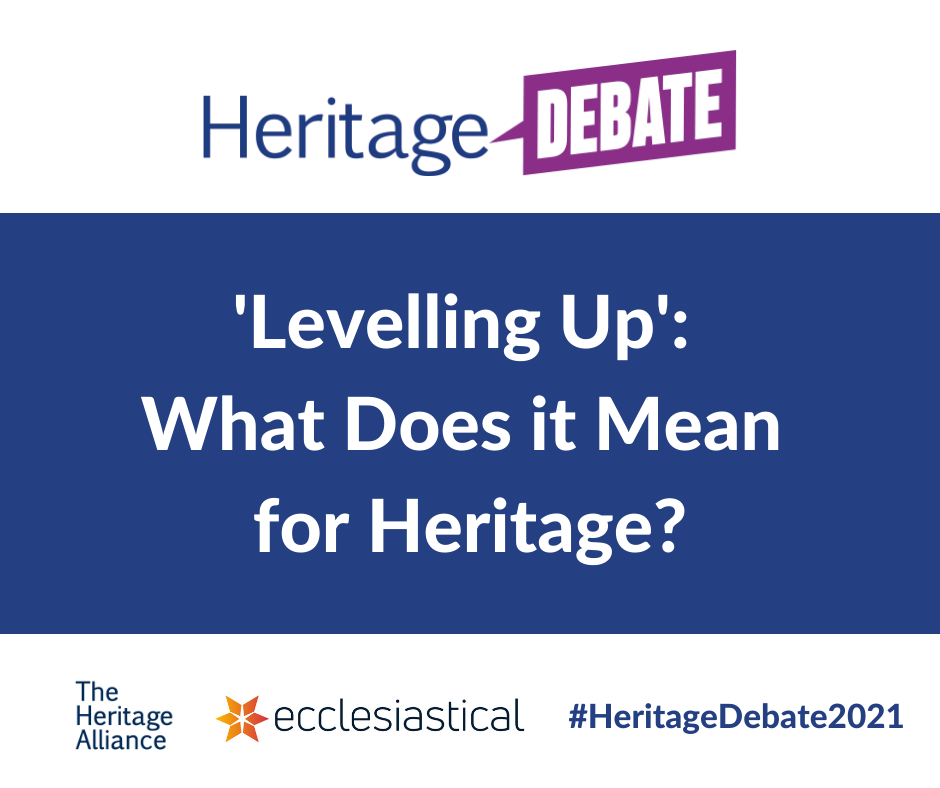 ‘Levelling Up’: What Does it Mean for Heritage?
‘Levelling Up’: What Does it Mean for Heritage?
Our virtual Heritage Debate 2021 took place on 30 November, focussed on the topic of ‘Levelling Up’: What Does it Mean for Heritage? We brought together panellists from across the sector to discuss, debate and put forward a range of perspectives on this topic: Dr Nicola Stacey, Director - Heritage of London Trust, Dr Tola Dabiri, Director - Brick by Brick Communities and Museum X, David Tittle, Chief Executive - Heritage Trust Network, Paul Clement, Chief Executive - Ipswich Central and Matthew McKeague, Director - Architectural Heritage Fund. The discussion was led by the Heritage Alliance Chair Pam Alexander OBE.
In line with this event, we invited heritage professionals to also share their perspectives in short blogs, which can be read on our dedicated blog site. You can also review discussion around this topic on social media by searching #HeritageDebate2021.
With thanks to our Corporate Partner Ecclesiastical Insurance Group and our sponsors the Architectural Heritage Fund for supporting this free event for the sector.
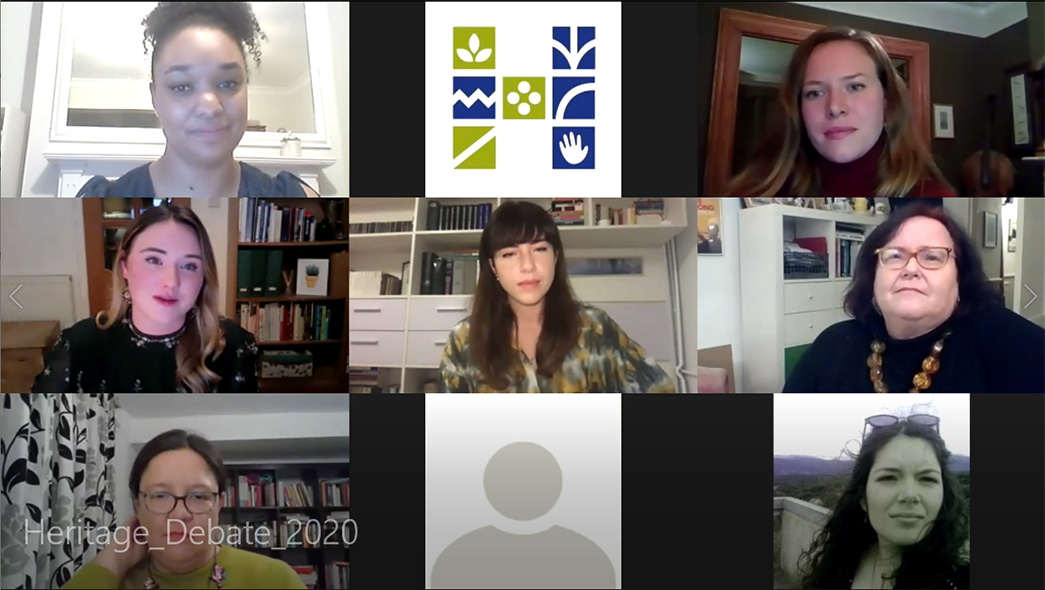 Young People and Heritage: Creating Lifelong Supporters?
Young People and Heritage: Creating Lifelong Supporters?
In 2020, we explored how young people engage with heritage and how the sector can support and empower these young people to become advocates for heritage into the future with the topic ‘Young People and Heritage: Creating Lifelong Supporters?’ Attendees were treated to a keynote speech from 4 of English Heritage’s Shout Out Loud Young Producers, who offered the panel provocations that kickstarted the Debate, and event sponsors Ecclesiastical offered an insight into their recent youth and heritage research study.
Co-Chaired by The Heritage Alliance’s own Daniella Briscoe-Peaple alongside Oxford University’s Alice Purkiss, we welcomed four panellists from across the sector:
- Alison Bowyer, Executive Director, Kids in Museums
- Ana Persinaru, Youth Engagement Consultant
- Anita Kerwin-Nye, Director of Strategy and Engagement, YHA
- Grace Connelly, SPAB Education and Training Officer.
In the lead-up to Heritage Debate 2020, we sought blogs from young people in the UK aged 16-24 with an interest in heritage to answer the question ‘What does heritage mean to you?’ - all their submissions can be read here here on our dedicated blogsite.
And the full debate can be watched here on Youtube.
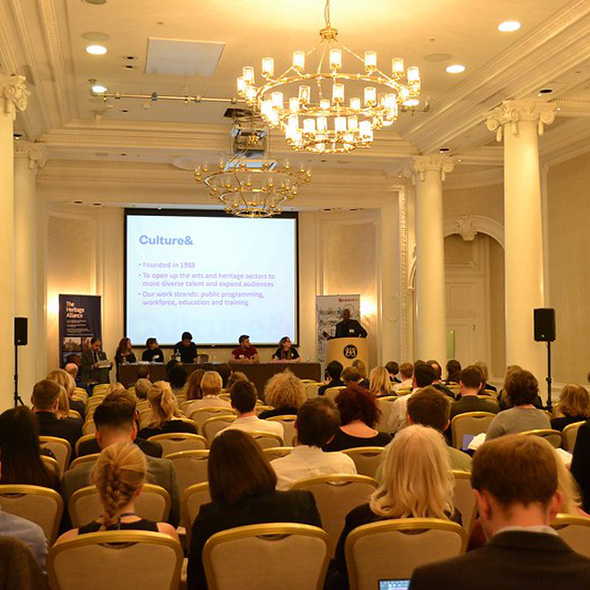 Reaching for Net Zero?
Reaching for Net Zero?
Our 2019 debate focused on the relationship between heritage and the environment. At a time when countries around the world, including the UK, are making commitments to move to a net zero emissions economy, now is the time to ensure that the heritage sector is involved in these discussions as we move into the future. We are very grateful to Ecclesiastical Insurance Group for sponsoring this event.
Panellists included:
- David Saddington, Environmentalist and Climate Change Communicator
- Keith Jones, Environmental Adviser for the National Trust
- Dr Meredith Wiggins, Historic England’s leading Environmental Analyst
- Dr Hannah Fluck, Head of Environmental Research
- Tim Heatley, Capital & Centric’s Co-Founder
You can listen to the debate here and download the slides here.
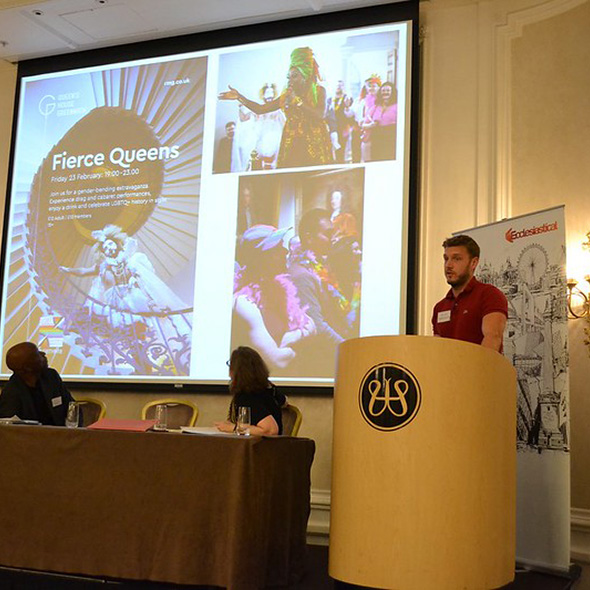 Diversifying heritage in the 21st century
Diversifying heritage in the 21st century
Our 2018 debate was centred around the challenge ‘how do we get more diverse audiences to connect with heritage?’ The speakers discussed class, disability, LGBTI+, BAME, women and youth in relation to the sector, exploring ways we can achieve better inclusion in terms of workforce diversity, public engagement and the narrative of collections/material culture and locations. We were looking to give participants a sense of the challenges the sector faces and the good practices we need to put in place to achieve greater diversity.
We heard from:
- Andrew Miller, UK Government Disability Champion for Arts and Culture
- Dr Corinne Fowler, Colonial Countryside: National Trust Houses Reinterpreted; Professor, University of Leicester
- Abigael Flack, Collections Officer, Multaka-Oxford Project, Pitt Rivers Museum & Museum of Science
- Jonathan Badyal, Head of Communications, Universal Music UK
- Errol Francis, Chief Executive of Culture
- Sacha Coward, LGBTQ+ positive museum work, Participation Producer, Royal Museums Greenwich
- Professor Margot Finn, President of the Royal Historical Society; Professor of Modern British History, UCL
You can watch the slides and listen to the audio of the debate here.
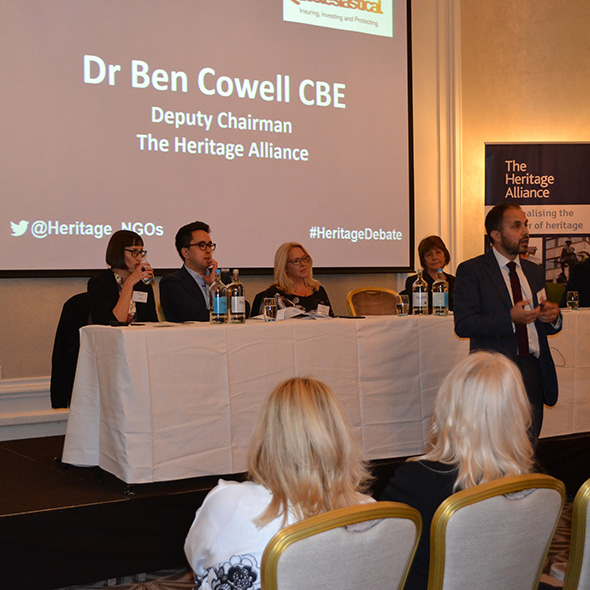 Is heritage good for your health?
Is heritage good for your health?
We like to think heritage is good for people’s wellbeing and health, and some evidence is starting to be available to back this up. Heritage participation can improve mental health, and the historic environment can provide an attractive backdrop to physical activity. This debate did not so much challenge these statements, as ask how the heritage sector can do better to build bridges with the world of public health. What claims can realistically be made for the health benefits of heritage, and where does heritage best intersect with the public health needs of the nation?
The panel included:
- Professor Helen Chatterjee, Professor of Biology at UCL Biosciences and Head of Research and Teaching, UCL Culture.
- Daniel Fujiwara, Director, Simetrica Consulting
- Ian Lush, Chief Executive, Imperial Health Charity
- Richard Osgood, Senior Archaeologist, Defence Infrastructure Organisation.
- Emma Hanson, Head of Strategic Commissioning Adult Community Support, Kent County Council
- Sue Gray, Director of Suffolk Mind
- Adala Leeson, Head of Social and Economic Research, Historic England
You can listen to the debate and see the accompanying slides on Youtube.
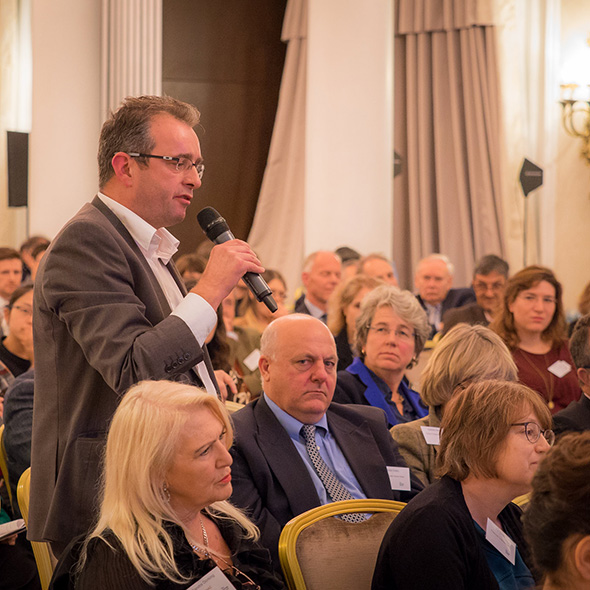 Heritage & Research: Bridging the Gap
Heritage & Research: Bridging the Gap
In 2016, our Heritage Debate explored how heritage research influences public and private sector decision-making – or not. Millions of choices are made in the property industry and by modest private owners every day, while champions like The Heritage Alliance need to access relevant and timely evidence to support their advocacy. Universities are increasingly required to be more engaged with external audiences and to demonstrate impact but the outcomes of academic research, whether from history or psychology faculties, do not always reach the audiences that can put them to good use.
Alliance Chairman Loyd Grossman introduced the evening, chaired by HLF Chief Executive and former Alliance trustee, Ros Kerslake. The panel included:
- Dr Oliver Cox, University of Oxford’s Heritage Engagement Fellow
- Bernard Donoghue, Chairman of The Tourism Alliance (and Alliance Trustee)
- Trevor Osborne, Chairman of The Trevor Osborne Property Group.
You can see the accompanying slides and listen to the debate here on Youtube.
The H Word: Heritage ‘Revisited’
This Heritage Debate explored perceptions of the word ‘Heritage’. Is it a help or hindrance in attracting political recognition or private investment or do outdated connotations perpetuate the myths that heritage is a brake on growth or just a warm bathe in nostalgia? ComRes, the leading research consultancy, launched a new snapshot of public perceptions of the word ‘heritage’.
You can see photos from the Debate here on Flickr.
Heritage and Government: Towards a Coherent Policy?
This debate examined the changing role the state has played in supporting our heritage for public benefit. Conrad Bird, Director of the Cabinet Office’s GREAT Britain campaign illustrated the importance of heritage to the UK’s position at the top of the soft power league. Sir Laurie Magnus, Chairman of Historic England outlined the new English Heritage model and warned that ‘the gravy train of state support has gone’. The 150-strong audience raised issues about education, everyday heritage, VAT and developers’ perceptions of heritage, local authority capacity and the fate of Local Authority heritage assets.
You can listen to the podcast here on SoundCloud and see photos from the debate here on Flickr.
Heritage and Identity: What makes you who you are?
Is heritage just a socially acceptable version of tribalism? Has social media produced a culture of ‘place-less’ relationships? These were some of the central themes explored in a major public debate on heritage and identity held at Newcastle University. The questions of how heritage affects people’s sense of identity and what heritage a North Easterner or Geordie would single out as shaping their sense of self were also on the agenda.
You can watch the debate here on YouTube.
Heritage and Philanthropy: Turning Public Passion into Pounds
The debate, Heritage and Philanthropy: Turning Public Passion into Pounds, covered topics including how to persuade people that culture is just as important as other causes in a crowded market, how to attract corporate and donor sponsorship for heritage outside London, how to foster common interests between the heritage and arts sector, alongside demonstrating the importance of social justice factors and the importance of valuing local support.
You can listen to a recording of the event here on Vimeo.
Heritage and Television: Who Profits More?
Broadcast heritage is a huge source of both information and entertainment, but what does heritage gain from this extensive exposure? The Debate, held at The Merchant Adventurers’ Hall, York, explored whether the face of heritage on TV really is a true picture, how television affects our perceptions of heritage, and how it influences the way heritage organisations engage with audiences
You can watch highlights of the debate here on YouTube.
Heritage and Profit: Who Gains Most?
The Debate, based in Paintworks, Bristol, explored how public and private interests use heritage to achieve their objectives and how economic activity around our older buildings, our heritage railways, our collections, our leisure moments and festival venues drive millions of businesses across the country. Far from being a brake on economic growth, heritage underpins some of our most powerful industries – tourism, construction and the creative and cultural industries.
Heritage and Tourism: Who Needs Whom?
This Debate, held at Magdalene College, Cambridge, explored the relationship between heritage and tourism and the extent to which heritage is becoming understood as simply a branch of the tourism industry. The event brought the heritage community, owners and users, together with senior figures from the heritage movement, the tourism sector, the private sector, and the world of academia.


 Heritage Debate 2024 – Balancing the Books: How Should the Heritage Sector Be Funded?
Heritage Debate 2024 – Balancing the Books: How Should the Heritage Sector Be Funded?

 Heritage Debate 2024 – Balancing the Books: How Should the Heritage Sector Be Funded?
Heritage Debate 2024 – Balancing the Books: How Should the Heritage Sector Be Funded? Heritage Debate 2023 – Careers at a Crossroads: How Can We Future-Proof the Heritage Sector Workforce?
Heritage Debate 2023 – Careers at a Crossroads: How Can We Future-Proof the Heritage Sector Workforce?
 ‘Levelling Up’: What Does it Mean for Heritage?
‘Levelling Up’: What Does it Mean for Heritage? Young People and Heritage: Creating Lifelong Supporters?
Young People and Heritage: Creating Lifelong Supporters? Reaching for Net Zero?
Reaching for Net Zero? Diversifying heritage in the 21st century
Diversifying heritage in the 21st century Is heritage good for your health?
Is heritage good for your health? Heritage & Research: Bridging the Gap
Heritage & Research: Bridging the Gap